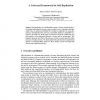Free Online Productivity Tools
i2Speak
i2Symbol
i2OCR
iTex2Img
iWeb2Print
iWeb2Shot
i2Type
iPdf2Split
iPdf2Merge
i2Bopomofo
i2Arabic
i2Style
i2Image
i2PDF
iLatex2Rtf
Sci2ools
111
click to vote
ECAL
2003
Springer
2003
Springer
A Universal Framework for Self-Replication
Abstract. Self-replication is a fundamental property of many interesting physical, formal and biological systems, such as crystals, waves, automata, and especially forms of natural and artificial life. Despite its importance to many phenomena, self-replication has not been consistently defined or quantified in a rigorous, universal way. In this paper we propose a universal, continuously valued property of the interaction between a system and its environment. This property represents the effect of the presence of such a system upon the future presence of similar systems. We demonstrate both analytical and computational analysis of self-replicability factors for three distinct systems involving both discrete and continuous behaviors. 1 Overview and History Self-replication is a fundamental property of many interesting physical, formal, and biological systems, such as crystals, waves, automata, and especially forms of natural and artificial life [1]. Despite its importance to many phenome...
Related Content
| Added | 06 Jul 2010 |
| Updated | 06 Jul 2010 |
| Type | Conference |
| Year | 2003 |
| Where | ECAL |
| Authors | Bryant Adams, Hod Lipson |
Comments (0)

